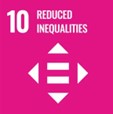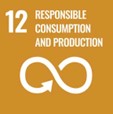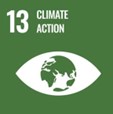2023 to 2027 Departmental Sustainable Development Strategy
Civilian Review and Complaints Commission for the RCMP
ISSN: 2817-7738
Section 1
Introduction to the Departmental Sustainable Development Strategy
The 2022 to 2026 Federal Sustainable Development Strategy (FSDS) presents the Government of Canada's sustainable development goals and targets, as required by the Federal Sustainable Development Act. This is the first FSDS to be framed using the 17 Sustainable Development Goals (SDGs) of the United Nations 2030 Agenda and provides a balanced view of the environmental, social and economic dimensions of sustainable development.
In keeping with the purpose of the Act, to make decision-making related to sustainable development more transparent and accountable to Parliament, the Civilian Review and Complaints Commission for the RCMP (CRCC) supports the goals laid out in the FSDS through the activities described in this Departmental Sustainable Development Strategy (DSDS).
The Federal Sustainable Development Act also sets out 7 principles that must be considered in the development of the FSDS as well as DSDSs. These basic principles have been considered and incorporated in the CRCC's DSDS.
In order to promote coordinated action on sustainable development across the Government of Canada, this departmental strategy integrates efforts to advance Canada's implementation of the 2030 Agenda National Strategy, supported by the Global Indicator Framework (GIF) and Canadian Indicator Framework (CIF) targets and indicators.
Section 2
Sustainable Development Vision of the Civilian Review and Complaints Commission for the RCMP
The CRCC is an independent agency created by Parliament to ensure that public complaints made about the conduct of RCMP members are examined fairly and impartially. The CRCC receives complaints from the public and conducts reviews when complainants are not satisfied with the RCMP's handling of their complaints.
The CRCC is dedicated to minimizing its environmental impact and promoting eco-friendly operations. Efforts to reduce paper usage are a key focus, and the CRCC has undertaken measures such as eliminating personal printers, promoting recycled paper and duplex printing, requiring that documents be filed electronically and encouraging tablet use for meetings and note-taking.
The CRCC's workplace strategy and hybrid work practices have led to a substantial reduction in office space usage. To reduce its office space further and lower its carbon footprint, the CRCC has entered into agreement for a mobility of 50% with Public Services and Procurement Canada.
Furthermore, the CRCC supports the goals laid out in the FSDS by complying with all reporting requirements, namely this inaugural DSDS. As required by the FSDS, the CRCC has established three new departmental actions and performance indicators in support of the following implementation strategies and associated FSDS Goals:
- Goal 10: Advance reconciliation with Indigenous Peoples and take action to reduce inequality
- Goal 12: Reduce waste and transition to zero-emission vehicles
- Goal 13: Take action on climate change and its impacts
Details on the departmental actions and the performance indicators are found in Section 4 below.
Section 3
Listening to Canadians
As required by the Federal Sustainable Development Act, the CRCC has taken into account comments on the draft 2022-2026 FSDS made during the public consultation held from March 11 to July 9, 2022.
During the public consultation, more than 700 comments were received from a broad range of stakeholders, including governments, Indigenous organizations, non-governmental organizations, academics, businesses, and individual Canadians in different age groups and of various backgrounds. The draft FSDS was also shared with the appropriate committee of each House of Parliament, the Commissioner of the Environment and Sustainable Development, and the Sustainable Development Advisory Council for their review and comment.
What We Heard
Across the submissions received, none directly pertained to the CRCC's mandate and program activities; however, the CRCC supports and incorporates many of the comments and suggestions received during public consultation into its planning, including:
- Acknowledging the rights and knowledge of Indigenous communities, as well as the importance of consultations and collaboration with Indigenous Peoples.
- Enhancing information and criteria for environmentally conscious procurement and adopting measures to achieve net-zero procurement, encouraging voluntary participation by organizations in the pursuit of net-zero emissions.
- Providing education about the impacts of climate change and offering relevant adaptive strategies to promote a shift towards environmentally responsible practices.
What We Did
The CRCC took into account the aforementioned priorities and recommendations while building this DSDS. As a result, mandatory training focused on Indigenous reconciliation will be required for all CRCC employees. Similarly, all employees involved in the CRCC's procurement process will be required to undergo green procurement training. Additionally, staff responsible for CRCC accommodations will receive training on climate change effects and practices promoting climate resilience.
Ultimately, the CRCC developed departmental actions and performance indicators to advance and report on the implementation strategies aligned with FSDS Goals 10, 12, and 13, which reflect the priorities voiced by Canadians during consultations. To elaborate, FSDS Goal 10 aligns with the priority of acknowledging Indigenous rights and knowledge, and the incorporation of consultations and collaboration with Indigenous communities into the CRCC's departmental actions. FSDS Goal 12 corresponds with the emphasis on strengthening green procurement and adopting net-zero procurement practices. Finally, FSDS Goal 13 is honoured by the emphasis on educating about climate change impacts and relevant adaptation measures in the interest of fostering more environmentally conscious practices.
Please find more information on the FSDS public consultation and its results in the FSDS Consultation Report.
Section 4
Commitments of the Civilian Review and Complaints Commission for the RCMP


Goal 10:
Advance Reconciliation with Indigenous
Peoples and Take Action on Inequality
FSDS context:
The CRCC's mandate is to ensure that public complaints made about the conduct of RCMP members are examined fairly and impartially. The CRCC receives complaints from the public and conducts reviews when complainants are not satisfied with the RCMP's handling of their complaints. The CRCC also conducts systemic investigations of RCMP activities.
Target theme: Advancing reconciliation with First Nations, Inuit, and the Métis communities
Target: Between 2023 and 2026, and every year on an ongoing basis, develop and table annual progress reports on implementing the United Nations Declaration on the Rights of Indigenous Peoples Act (Minister of Justice and Attorney General of Canada)
| IMPLEMENTATION STRATEGY | DEPARTMENTAL ACTION | PERFORMANCE INDICATOR STARTING POINT TARGET |
HOW THE DEPARTMENTAL ACTION CONTRIBUTES TO THE FSDS GOAL AND TARGET AND, WHERE APPLICABLE, TO CANADA'S 2030 AGENDA NATIONAL STRATEGY AND SDGs |
|---|---|---|---|
Implement the United Nations Declaration on the Rights of Indigenous Peoples Act |
Program: Ensure that all CRCC employees complete the training on Reflecting on Cultural Bias: Indigenous Perspectives K099 (IRA101) related to reconciliation with First Nations, Inuit and Métis People. |
Percentage of CRCC employees that have completed training related to reconciliation with Indigenous Peoples (excluding new employees for the first year of employment). Starting point: 74% completed on April 1, 2023 Target: 90% by March 31, 2024 |
Initiatives advancing Canada's implementation of SDG 10 – Reduced Inequalities
The following initiatives demonstrate how the CRCC programming supports the 2030 Agenda and the SDGs, supplementing the information outlined above.
PLANNED INITIATIVES |
ASSOCIATED DOMESTICS TARGETS OR AMBITIONS AND/OR GLOBAL TARGETS |
|---|---|
|
Participate in workshops and training sessions on Indigenous issues, such as:
|
Seek to enhance the CRCC knowledge and understanding of Indigenous Peoples' rights and cultures, contributing to the overall objectives of reconciliation |

Goal 12:
Reduce Waste and Transition
to Zero-emission Vehicles
FSDS context:
The CRCC is a micro-organization that works closely with other departments to facilitate its internal functions. Despite the relatively small scope of its procurement activities, the CRCC remains dedicated to the consideration of Canada's environmental obligations. In alignment with this objective, the CRCC is committed to providing its procurement personnel with training to ensure they are well-informed and up to date regarding the federal government's Policy on Green Procurement. This training also includes strategies for implementing green procurement principles and recognizing the attributes of environmentally friendly goods and services. By undergoing this training, the CRCC's procurement staff will be equipped to integrate green procurement considerations into their decision-making processes.
Target theme: Federal leadership on responsible consumption
Target: The Government of Canada's procurement of goods and services will be net-zero emissions by 2050, to aid the transition to a net-zero, circular economy (All Ministers)
| IMPLEMENTATION STRATEGY | DEPARTMENTAL ACTION |
PERFORMANCE INDICATOR |
HOW THE DEPARTMENTAL ACTION CONTRIBUTES TO THE FSDS GOAL AND TARGET AND, WHERE APPLICABLE, TO CANADA'S 2030 AGENDA NATIONAL STRATEGY AND SDGs |
|---|---|---|---|
Strengthen green procurement criteria |
Program: Ensure that all CRCC employees involved in the procurement of goods and services complete training on green procurement. Code: C215 (COR405) https://catalogue.csps-efpc.gc.ca/product?catalog=COR405&cm_locale=en
|
Performance indicator: Percentage of CRCC employees involved in the procurement of goods and services that completed green procurement training (excluding new employees for the first year of employment). Starting point: 0% on April 1, 2023 Target: 90% by March 31, 2024 |
Relevant targets or ambitions: CIF Ambition/Target: Canadians consume in a sustainable manner. CIF Indicator: Proportion of businesses that adopted selected environmental protection activities and management practices. GIF Target: Promote public procurement practices that are sustainable, in accordance with national policies and priorities. |
Initiatives advancing Canada's implementation of SDG 12 – Responsible Consumption and Production
The following initiatives demonstrate how the CRCC programming supports the 2030 Agenda and the SDGs, supplementing the information outlined above.
PLANNED INITIATIVES |
ASSOCIATED DOMESTICS TARGETS OR AMBITIONS AND/OR GLOBAL TARGETS |
|---|---|
|
Training To add a new mandatory training to the matrix and ensure that all CRCC employees involved in the procurement of goods and services complete training on green procurement. Code: C215 (COR405) https://catalogue.csps-efpc.gc.ca/product?catalog=COR405&cm_locale=en |
|

Goal 13:
Take Action on
Climate Change and its Impacts
FSDS context:
The CRCC is a micro-organization that works closely with other departments to facilitate its internal functions and does not own any real property or a fleet of vehicles. Despite the relatively small scope, the CRCC has aligned itself to the Federal Sustainable Development Act by way of integrating and making decisions that contribute to the advancement of sustainable development.
The organization is proactive in the following areas:
- acknowledgement that sustainable development is a continuously evolving concept, which requires the CRCC to be responsive and agile to these changes;
- the principle of integrational equality, in that the needs of the present generation does not compromise those of the future;
- the principle of openness and transparency;
- the principle of collaboration; and
- delivery of results that meet the CRCC's identified objectives.
The actions are measurable activities in an effort to meeting Canada's FSDS that came into force on November 10, 2017.
Target theme: Federal leadership on greenhouse gas emissions reductions and climate resilience
Target: The Government of Canada will transition to net-zero carbon operations for facilities and conventional fleets by 2050 (All Ministers)
| IMPLEMENTATION STRATEGY | DEPARTMENTAL ACTION | PERFORMANCE INDICATOR STARTING POINT TARGET |
HOW THE DEPARTMENTAL ACTION CONTRIBUTES TO THE FSDS GOAL AND TARGET AND, WHERE APPLICABLE, TO CANADA'S 2030 AGENDA NATIONAL STRATEGY AND SDGs |
|---|---|---|---|
Implement the Greening Government Strategy through measures that reduce greenhouse gas emissions, improve climate resilience, and green the government's overall operations |
Program: IM/IT: Workplace Accommodation Consultation Series: Acquisition of IT-Related Adaptive Products and Services (INC1-V36) https://www.csps-efpc.gc.ca/video/workplace-accommodation/acquisition-eng.aspx All CRCC employees understand the impact of accommodation measures in the workplace. https://catalogue.csps-efpc.gc.ca/product?catalog=INC120&cm_locale=en |
Performance indicator: Starting point: Target: |
|
Other |
Program: Empowering employees to consider healthier ways of commuting or travelling to work that minimize impacts on the environment so that we can collectively contribute to a sustainable future. |
|
|
Initiatives advancing Canada's implementation of SDG 13 – Climate Action
The following initiatives demonstrate how the CRCC programming supports the 2030 Agenda and the SDGs, supplementing the information outlined above.
PLANNED INITIATIVES |
ASSOCIATED DOMESTICS TARGETS OR AMBITIONS AND/OR GLOBAL TARGETS |
|---|---|
|
Climate change training (e.g., calculating carbon footprint as it pertains to in-office commute) |
Greater organizational awareness and sensitization towards climate change and its impacts |
Section 5
Integrating Sustainable Development
The CRCC has never conducted a strategic environmental assessment (SEA). The CRCC's primary focus is the review and handling of complaints related to the RCMP. Consequently, the CRCC rarely develops and proposes new policies and programs that have ecological ramifications as well as influence the Federal Sustainable Development Strategy (FSDS) objectives and aims. However, the CRCC remains committed to incorporating assessments of environmental effects and alignment with FSDS objectives and goals into its decision‑making procedures through potential future SEA processes, if deemed necessary.
- Date modified:

